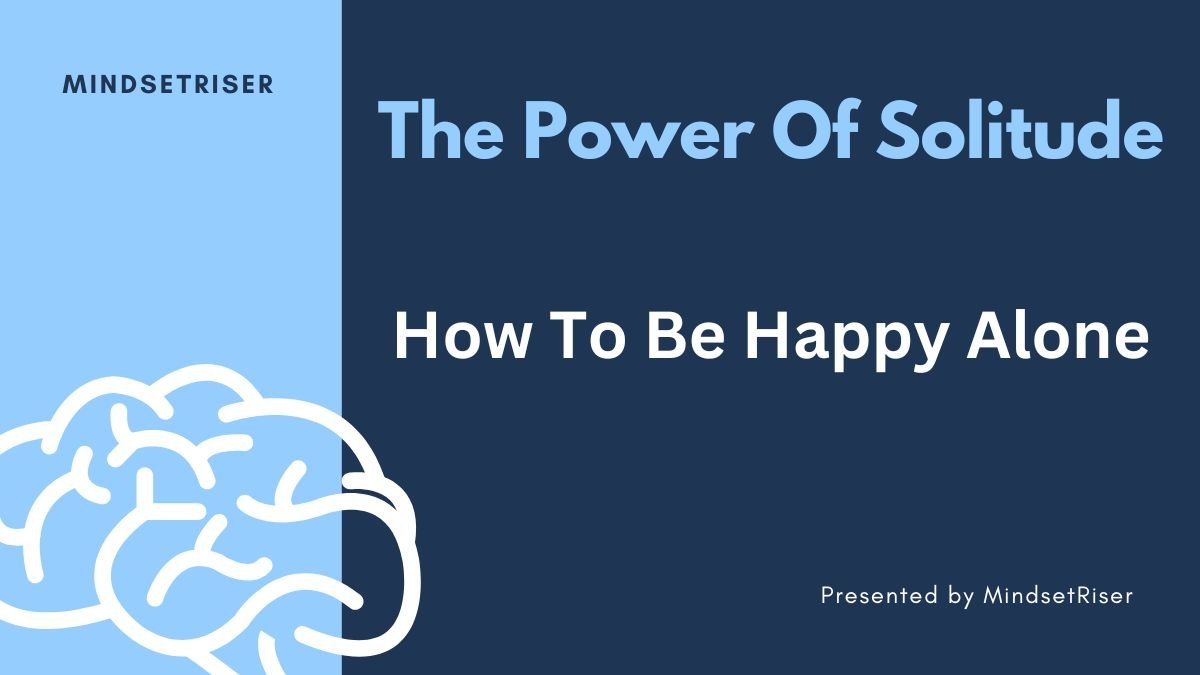How to Be Happy Alone (The Power of Solitude)
How to Be Happy Alone (The Power of Solitude)
In a world that often emphasizes the importance of relationships and social connections, it can be difficult to embrace being alone. But solitude is not synonymous with loneliness. In fact, being happy alone can be one of the most empowering and transformative experiences you can have. It provides an opportunity to reconnect with yourself, explore your passions, and cultivate independence.
In this article, we’ll explore the power of solitude, the benefits of being alone, and practical steps you can take to embrace being happy alone.
The Difference Between Solitude and Loneliness
Before diving into the benefits of solitude, it’s important to clarify the difference between solitude and loneliness.
- Solitude is the state of being alone, by choice, and finding comfort and peace in that state.
- Loneliness, on the other hand, is the feeling of sadness or emptiness due to a lack of social connection.
Solitude is a healthy and empowering choice. It’s an opportunity to recharge, reflect, and grow. Loneliness, however, stems from a sense of isolation that can feel emotionally draining and disheartening. The key is in how we view and approach being alone. Choosing solitude can lead to personal growth and inner peace.
The Benefits of Being Happy Alone
1. Self-Discovery and Personal Growth
Spending time alone provides an opportunity for self-reflection and self-discovery. When you are not distracted by the demands and opinions of others, you can focus on your own thoughts, values, and aspirations. This quiet time allows you to connect with your true self and discover what makes you truly happy.
How to Embrace It:
- Journal your thoughts: Writing down your feelings and experiences is a great way to reflect and understand yourself better.
- Set personal goals: Use your alone time to identify what you want to achieve, whether it’s related to career, health, or hobbies.
2. Increased Creativity and Productivity
When you’re alone, you have the space to tap into your creativity and be more productive. Whether you’re working on a project, learning a new skill, or pursuing a hobby, solitude can provide the mental clarity needed to think freely and deeply. Without external distractions, your mind is free to explore new ideas and solutions.
How to Embrace It:
- Engage in a creative hobby: Painting, writing, cooking, or playing a musical instrument can be great outlets for your creativity.
- Work in a quiet environment: If you’re working on a project, try to create an environment that minimizes distractions, allowing you to focus better.
3. Emotional Independence
Being happy alone means you learn to rely on yourself for emotional well-being. Instead of seeking external validation, you can find comfort in your own company. Emotional independence helps build self-confidence and resilience. You begin to realize that your happiness does not depend on others, but on your ability to nurture your own emotions and mindset.
How to Embrace It:
- Practice self-love: Take time to appreciate yourself and your strengths, recognizing that you don’t need anyone else’s approval to feel good about who you are.
- Meditate: Meditation helps you connect with your emotions and become more in tune with your inner world, fostering emotional independence.
4. Greater Mental Clarity
When you spend time alone, you give your mind a chance to reset and process your thoughts. Mental clarity is often lost in the hustle and bustle of daily life. Solitude allows you to calm your mind, reduce stress, and make clearer, more deliberate decisions. With fewer distractions, you can focus on your priorities and gain perspective on life.
How to Embrace It:
- Practice mindfulness: Being present in the moment helps you gain clarity and reduce mental clutter.
- Take time for silence: Spend time each day in complete silence, allowing your thoughts to settle and your mind to relax.
5. Building Stronger Relationships with Others
While it may seem counterintuitive, spending time alone can actually improve your relationships with others. When you learn to enjoy your own company, you stop relying on others to fill the gaps in your life. As a result, you become more secure in relationships and less dependent on others for happiness.
How to Embrace It:
- Cultivate quality friendships: Instead of seeking validation from a large social circle, focus on developing deep, meaningful connections with a few people.
- Give yourself space: In relationships, take time for yourself to recharge and maintain your sense of individuality.
Practical Tips for Being Happy Alone
1. Cultivate a Positive Mindset
The key to enjoying time alone is having a positive mindset. Instead of viewing solitude as something negative, focus on the benefits it brings. Affirmations and positive thinking can help shift your perspective.
How to Embrace It:
- Practice gratitude: Write down things you’re thankful for each day to shift your focus to the positive aspects of being alone.
- Challenge negative thoughts: When feelings of loneliness or sadness arise, counter them with affirmations or positive statements about your own worth.
2. Focus on Hobbies and Interests
Solitude is the perfect time to pursue your passions and hobbies. Whether it’s reading, cooking, hiking, or learning a new language, engage in activities that bring you joy and fulfillment.
How to Embrace It:
- Dedicate time for hobbies: Set aside time each week to do something you love, whether it’s creative or intellectual.
- Try something new: Experiment with a new hobby or skill that piques your interest and adds excitement to your alone time.
3. Create a Cozy, Inspiring Environment
Your environment plays a big role in how you feel when you’re alone. Make your space inviting and comfortable so that you enjoy spending time in it.
How to Embrace It:
- Decorate your space: Fill your home with things that inspire you—art, plants, comfortable furniture, and items that reflect your personality.
- Set the mood: Light candles, play relaxing music, or create a calming atmosphere that promotes well-being.
4. Enjoy Your Own Company
One of the best ways to be happy alone is to learn how to enjoy your own company. This might seem difficult at first, especially if you’re used to always being surrounded by others. However, once you start valuing your own presence, you’ll discover how fulfilling it can be.
How to Embrace It:
- Go on solo dates: Take yourself out to a movie, dinner, or walk in the park to learn how to enjoy your own company.
- Be mindful: Pay attention to how you feel in the moment, and appreciate the peace that comes with solitude.
Final Thoughts
Being happy alone is not about avoiding relationships or being anti-social. It’s about learning to appreciate your own company and discovering the power of solitude. When you embrace being alone, you build a stronger connection with yourself, leading to personal growth, inner peace, and a deeper sense of happiness.
So, take the time to enjoy your own company, pursue your passions, and become more independent. By doing so, you’ll find that being alone can be one of the most enriching experiences of your life.

